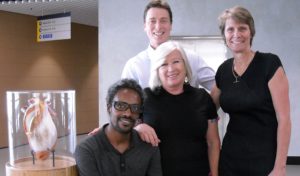
Imagine you could monitor your respiratory rate, body temperature and cardiac health, just by wearing an item of clothing in the comfort of your own home.
Thanks to support from the Tom Simpson Trust Fund, administered through the National Heart Foundation of Australia (South Australia Division), Flinders PhD student Meseret Teferra is one step closer to achieving this dream.
Late last year Mr Teferra was awarded $15,154 to purchase equipment to create a textile-based ECG monitor for home-based cardiac rehabilitation, and to develop an e-textile t-shirt to measure ECG.
E-textiles are simply fabrics (or clothing) that contain electronic elements or circuits which are woven directly into the material.
According to the Australian Institute of Health and Welfare, cardiovascular disease (CVD) remains a major health problem in Australia, with approximately 1 in 5 Australian adults (or 4.2 million people) reported with CVD in 2014-15.
The aim of this project is to create a personalised wearable e-textile, in the form of a t-shirt, which will collect basic physiological measurements and monitor a patient’s cardiac rehabilitation from home.
The signals are delivered in real-time to a remote hospital-based workstation to determine the health status of the person wearing the t-shirt and monitor their rehabilitation progress over time.
Matthew Flinders Distinguished Professor Karen Reynolds is one of three supervisor’s for this PhD project and says that the funding is critical to enable us to realise this innovative and intelligent project.
“E-textile technology is a rapidly growing field of research and provides a novel way to monitor a patient’s day-to-day cardiac health in their own environment, without the need for them to wear other add-on devices”.
“Using this technology, we hope to reduce the time for hospital stays and increase accessibility of cardiac rehabilitation services especially for the elderly and for those who live remotely from service centres” says Professor Reynolds.
Flinders University is pleased to expand its research into e-textile technologies and are thrilled to welcome Visiting Endeavour Research Fellow Amanda Fleury, a specialist in this growing area.
Dr Fleury recently completed her PhD in Biomedical Engineering at the University of Toronto, Canada, investigating the use of electronic textiles in rehabilitation.
Over the next four months, Dr Fleury will work with Professor Reynolds and other researchers in the Medical Device Research Institute, to investigate new wearable sensing technologies for the treatment of positional sleep apnoea and for the kinematic analysis of gait.

